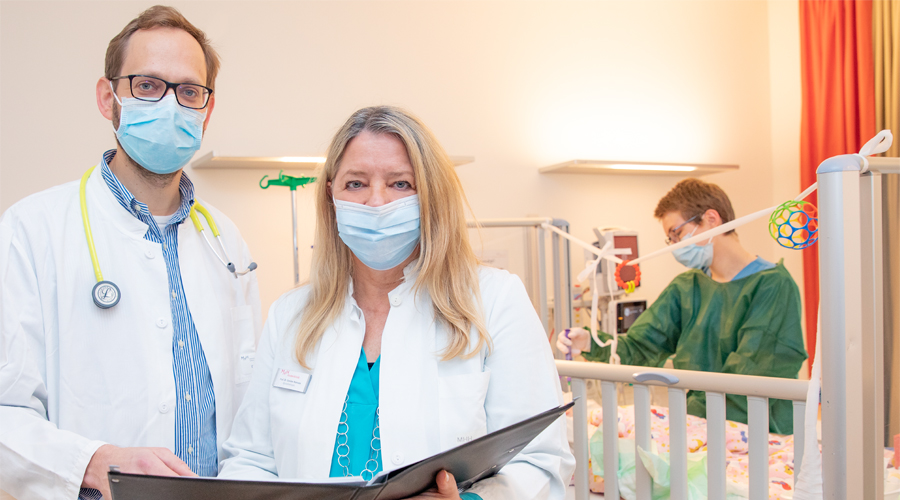Fever, cold, cough, sore throat – many babies and small children are currently lying in bed with an infection. Often the trigger is the so-called respiratory syncytial virus (RSV), which is being researched in the RESIST project A1. The team of this project, led by Prof. Hansen and Prof. Pietschmann, is looking for factors in the genome that favour a severe disease and make it predictable. With reliable indications of a severe course of the disease, children could be immunised as a preventive measure.
In the following interview, Dr. Martin Wetzke, senior physician at the MHH Clinic for Paediatric Pneumology, Allergology and Neonatology, answers questions about the many cases of the respiratory disease in paediatric clinics at present.
What is behind the RS virus?
The RS virus is actually an old acquaintance. It causes respiratory infections in people of all ages during the cold season. Normally, most people are infected with the virus at least once in their first two years of life. In the course of their lives, they are repeatedly infected with it and thus train their immune system. While the infection in older children and in adulthood often only manifests itself as a minor cold, RSV can lead to severe respiratory illnesses, even pneumonia, in some babies and toddlers who are otherwise quite healthy. Babies with pre-existing conditions such as heart defects or those born extremely prematurely are particularly at risk.
Last year, the RS virus appeared unusually early. What is the current situation?
This year we are also observing an unusually early season, but this year we are also seeing an increased number of sick children with RSV in the clinics and practices. Many clinics are reaching the limits of their admission capacity. This is not only due to the high number of cases, but often also to the lack of capacity in the clinics. There is a lack of nursing staff, so that not all beds can be operated.
What is the reason for the renewed strong wave of infections?
The Corona pandemic plays a role. Because of the mask requirement, the distance ban and the lockdowns, far fewer people were infected with the RS virus during that time and were therefore unable to build up immunity or boost their immunity. With the relaxation of the Corona measures, the virus can then hit significantly more unprotected people and spread rapidly.
So there is a catch-up effect …
Yes, this effect certainly relates to the number of cases. Infections that were otherwise spread over several years are now concentrated. Whether the infections are also more severe this year cannot yet be said; we are currently looking into this in an epidemiological study.
What would have happened in terms of RSV infections without Corona measures?
In absolute terms, probably just as many children would have been infected, only more evenly distributed in time. By the way, a later infection does not harm the immune system, it learns anyway and builds up an immune protection. The situation is somewhat different for newborns. Because of the lack of their own antibodies against RSV, pregnant women could hardly pass on immunity to the unborn child. And breastfeeding mothers could not pass on sufficient immunity to the newborns via breast milk. The fewer maternal RSV antibodies newborns get during pregnancy, the more susceptible they are to a severe course of RSV infection.
How do you treat affected children on the ward?
A major problem in the treatment of children with RSV is that there is no specific therapy. So we doctors can only give supportive treatment: If necessary, the children are given oxygen or breathing support. We also make sure that the children drink enough fluids. Because if the children have difficulties breathing, they are often no longer able to drink on their own. In most cases, the children are cared for on the normal ward. Only in rare cases is care in the intensive care unit necessary.
What should parents be aware of? What symptoms should they see a doctor about with their children?
Dr. Martin Wetzke: An infant with signs of a respiratory infection and fever should always be presented to a paediatrician. If breathing is clearly more difficult and faster, the child should also be seen in an emergency room outside normal opening hours. The same applies if children do not drink enough in the course of a respiratory tract infection.
Are infections with RS viruses also the subject of research at the MHH outside the RESIST project mentioned above?
Yes, the second project is the multicentre PAPI study in cooperation with the CAPNETZ Foundation. In this study, scientists systematically collect data on the frequency, course and pathogens of respiratory diseases in infants and young children over three winter semesters. The study also collects concrete facts and figures on RSV infections.
Author: Tina Götting
The photo shows Prof. Hansen and PD Dr. Martin Wetzke (left).

